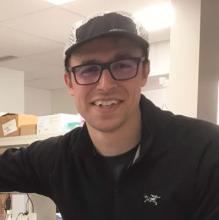Mark Trinder
Why did you decide to pursue a graduate degree?
In short, I enjoy the process of developing novel solutions to complex problems. It is thrilling to be one of the few people in the world working to answer a specific question that could have major implications to technology and/or medicine. Furthermore, the PhD degree meshes well with the greater demand for evidence-based medical practice. The need for clinicians to be able to understand both basic science and clinical practice is becoming ever more critical with the remarkable advancements in molecular biology.
Why did you decide to study at UBC?
UBC is a world-renowned research and medical institution situated between the natural beauty of mountains, forests, and ocean. The supervision of the PhD portion of my MD/PhD degree by Dr. Liam Brunham’s lab at the University of British Columbia’s Heart and Lung Institute (HLI) was a major factor influencing my decision to study at UBC. The HLI has an established ability to perform effective translational research among a unique confluence of expertise: lipids, genetics, sepsis, and critical care medicine. Due to my previous and ongoing interests in microbiology, the greatest draw to the Brunham lab was his ongoing collaborations with the institution’s sepsis investigators (Dr. John Boyd, Dr. Keith Walley, Dr. James Russel).
What is it specifically, that your program offers, that attracted you?
UBC’s Undergraduate MD Program stresses the combination of clinical studies, research, and teaching. The recent modification of the UBC Undergraduate MD Program reflects these priorities. The MD Program’s goals address the importance of innovation, research, internationalization, faculty development, and a productive learning environment. These skill sets will be critical for me to further develop as an aspiring physician scientist. UBC’s Undergraduate Program also offers unique Flexible Enhanced Learning courses early in the curriculum which will be a fantastic opportunity to tie my research training to clinical issues. Most importantly, the MD/PhD program's mission “to develop ‘physician-scientists’ with training in knowledge translation between scientific/clinical and patient population treatment settings” matches my own.
What was the best surprise about UBC or life in Vancouver?
Location, location, location. The access to the great outdoors (mountains, ocean, beaches) is remarkable.
What do you like to do for fun or relaxation?
Outside academics, I train and participate in endurance races (ultramarathons, triathlons), brew beer, and build LEGO.
What advice do you have for new graduate students?
1) Take initiative in your degree and what you want to get out of the experience. 2) Make sure to talk to plenty of other graduate students and researchers. Otherwise, grad school can be a very steep learning curve. 3) It is too easy to become an experiment lab rat. Make sure to take time to think and reflect on the purpose, relevance, and implications, of your experiments.
